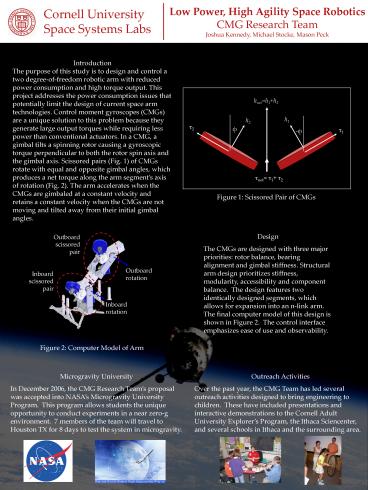Cornell University - PowerPoint PPT Presentation
1 / 1
Title:
Cornell University
Description:
Control moment gyroscopes (CMGs) are a unique solution to this problem because ... in Figure 2. The control interface emphasizes ease of use and observability. ... – PowerPoint PPT presentation
Number of Views:116
Avg rating:3.0/5.0
Title: Cornell University
1
Low Power, High Agility Space Robotics CMG
Research Team Joshua Kennedy, Michael Stocke,
Mason Peck
Cornell University Space Systems Labs
Introduction The purpose of this study is to
design and control a two degree-of-freedom
robotic arm with reduced power consumption and
high torque output. This project addresses the
power consumption issues that potentially limit
the design of current space arm technologies.
Control moment gyroscopes (CMGs) are a unique
solution to this problem because they generate
large output torques while requiring less power
than conventional actuators. In a CMG, a gimbal
tilts a spinning rotor causing a gyroscopic
torque perpendicular to both the rotor spin axis
and the gimbal axis. Scissored pairs (Fig. 1) of
CMGs rotate with equal and opposite gimbal
angles, which produces a net torque along the arm
segments axis of rotation (Fig. 2). The arm
accelerates when the CMGs are gimbaled at a
constant velocity and retains a constant velocity
when the CMGs are not moving and tilted away from
their initial gimbal angles.
Design The CMGs are designed with three major
priorities rotor balance, bearing alignment and
gimbal stiffness. Structural arm design
prioritizes stiffness, modularity, accessibility
and component balance. The design features two
identically designed segments, which allows for
expansion into an n-link arm. The final computer
model of this design is shown in Figure 2. The
control interface emphasizes ease of use and
observability.
Microgravity University In December 2006, the CMG
Research Teams proposal was accepted into NASAs
Microgravity University Program. This program
allows students the unique opportunity to conduct
experiments in a near zero-g environment. 7
members of the team will travel to Houston TX for
8 days to test the system in microgravity.
Outreach Activities Over the past year, the CMG
Team has led several outreach activities designed
to bring engineering to children. These have
included presentations and interactive
demonstrations to the Cornell Adult University
Explorers Program, the Ithaca Sciencenter, and
several schools in Ithaca and the surrounding
area.































